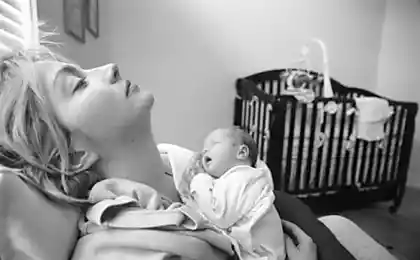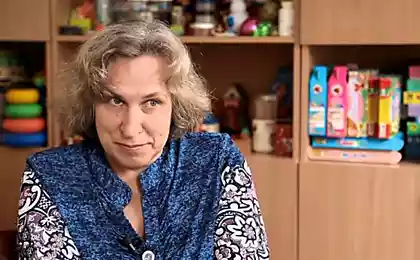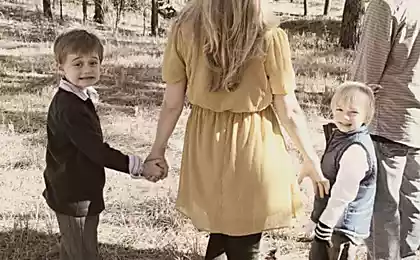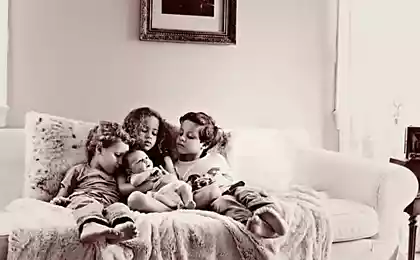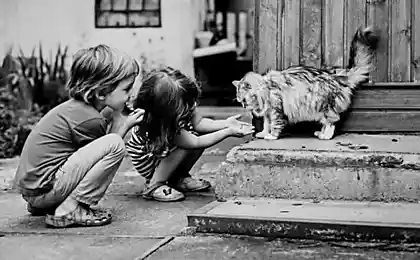440
Twenty years ago, pediatricians and child psychologists have attempted to say that his kids something is amiss
In all textbooks on child psychology describes the tragic to the psyche of the consequences of hospitalism – when for child caring, providing everything needed for physical survival, but don't love him, don't communicate with him when no him personally, this child belonging to an adult. Of course, nobody put such monstrous experiments on living children; but, observe, this can be in any children's Home, where one child has a lot of abandoned or orphaned kids, and pay her not for love, but for basic hygiene and safety. About the same Western psychologists could observe in orphanages and shelters of the past and the current century.
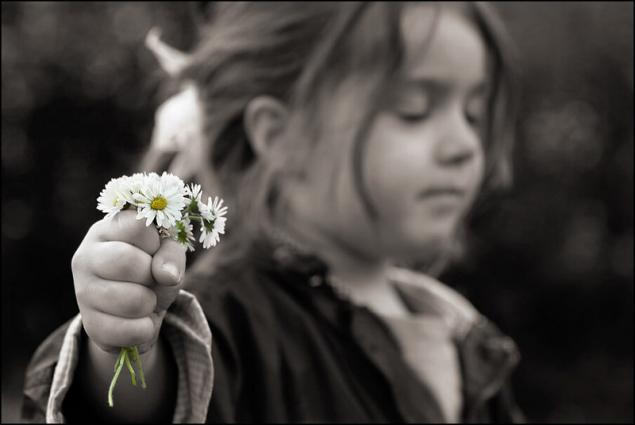
All these observations have shown that devoid of personal care, love and affection, the child can not develop fully: much later, he begins to walk, talk, fear of the outside world have blocks without a sense protect baby's innate curiosity, the research (estimated) instincts. It is a proven fact that children who grew up not in a family experiencing particular difficulties in intimate relationships, they have difficulty starting a family and are often not very good parents to their children in all that relates to emotional ties (as we just learned, is vital for normal development).
The opposite pole – family-children from full families, from childhood surrounded by love and attention of loved ones. And that between these poles?
Between – single-parent families, dysfunctional families, family, parents which for some reason or cold to the children. Between – children, conducting a huge part of life away from home, in nurseries, in gardens-provides trainings for five days.
In 1979 he held scientific-practical conference with the captivating title “the Psychological basis of identity formation in terms of public education.” Abstracts published an edition of 500 copies on the rotaprint, so they are gathering dust somewhere on the shelves: the “secret” is not necessary, who there finds itself nose...
And for good reason. Twenty years ago, the pediatricians and child psychologists tried to tell society that its children that something was wrong.
For example, in one of the reports told about results of fifteen years of observation of one year old babies, which exactly at this age it was customary to give the nursery. How they, remaining without a mother, sharply spiked level of adrenaline in blood – a true companion of this stress, and holding someone for three hours, someone three days someone three months, and someone in three months, I jumped. How children lost acquired skills, in addition to the motor: with the quickness of a small animal, they crawled into a corner of the arena, to even the back has been protected. How terribly afraid of peers and persistently yelled, ensuring that they took at the hands of an adult. That was the slowest suffered and recovered the rudiments of intelligence: the children of the house passed by this time from Gulen to the talk, which is already “predict”, returned back; exhausted curiosity, driven by fear and anxiety. Another said that some (“hard adaptation”) the so-called nursery stress lasts up to six months; anyone who has ever watched the development of young children, he knows how it is incredibly a lot – six months. Of course, not talked at the conference about a more lasting and profound implications of stress because they are still not studied.
However, we can assume that this first experience of helpless abandonment and terror from the total of their vulnerability in a world full of dangers, and hardly increases the openness to the world, trusting to him, who – as the basic properties of the individual – the infant, according to American psychologists, gains in the first six months of life. And it depends on the emotional relationship with the mother during the lactation period. It's only the established connection and subjected to the test “stress nursery”.
In kindergarten, as they have to be considered (by anyone, not just psychologists), the education starts social skills that are difficult to acquire in the family and that easily and naturally acquired in dealing with their own kind under the supervision of a qualified adult. To start this education and we have put three years. But numerous experiments have shown that at this age the need of the child in the adult as a source of protection and emotional support, but also patterns of behavior – three-year period is much higher than in communicating with peers, chat with them, he just can not, they are of minimal interest, and only a special effort of the adult can awaken this interest. Psychologists once asked how many times appeals to each child in a specially designated for playing games and chatting for two hours a kindergartener. It is estimated that the average caregiver is 0 to 5 times. And most often he communicates with the most active children and so not too many problems, and the share closed or slightly retarded children just have the one 0, although they are the most and need attention of an adult. This, incidentally, also spoke at that conference in 1979.
Excommunicated from the house for most of the day children are almost nowhere to take samples close relations of people with each other. Of course, in the evening, after kindergarten, tired mother manages to say a few kind words to the husband, too tired and just settled down watching TV. Of course, some experience the child will receive at the weekend, during a vacation if you spend it with parents. But all of this material is sorely lacking, not that more or less clear idea about the strategies of intimate relations of people with each other, but, according to the latest research, the material is not enough even for baby role-play: the children all play fewer adult relatives, often reproduce in these games, the plots of TV series on josé Ignacio and Maria, who is constantly crying.
The love and unconditional support adult create psychological the rear, give the confidence that you're a really valuable object, worthy of love and respect. The first self-constructed solely from the opinions of close adults, their relationship to the child. A man is largely what he himself sees; so it applies to others, developing behavior strategies depending on this “self-concept”.
As revealed in the eighties in kindergartens-the study provides trainings for five days, more than half of babies between four and six believe that moms don't like them. In the end it is not so important whether it's true or not, it is important that they think so...
Which is already a generation grows up in our nurseries and kindergartens?
Perhaps the ability to love another person, no matter, child, husband, friend, or mom, was given not to everyone. Probably, the number of people who are given this gift from birth, by nature, as constantly, as the number of geniuses in math or serious mental patients (the latter, for example, experts have calculated that about 5 percent of the population in all times and among all peoples). However, it is certain that this emotion is to occur, must adopt a kind of cultural form, its in a different era. Of course, love is not taught how to play the piano, but still there is need samples, experience, absorb from childhood the air of a family atmosphere, from the forms taken by his father and mother and is adopted in which the reciprocal affection of the child.
Torn from his family, deprived of “their adult children from generation to generation has remained without this experience of love. Insecure, complex. People who really want to love but can't.
Psychologists say that the greatest difficulties modern Teens are experiencing, establishing normal human relationships with each other. Sociologists argue that the young couple do not expect emotional support from their wives and husbands in difficult times. Today's high school students would most like in the future to create a happy family, but most of them believe that it's impossible.
Family crisis happening across the ecumene developed European countries. Always looking for new forms of family coexistence. We have a crisis is clearly aggravated by the Soviet system of public preschool education, as it developed and still exists today. I don't think it is urgent to drive to work all mothers and to put them at home with the kids – it is hardly possible, and hardly something will change.
You must at least recognize the problem... posted
P. S. And remember, just changing your mind - together we change the world! ©
Source: ps.1september.ru/article.php?ID=200106415

All these observations have shown that devoid of personal care, love and affection, the child can not develop fully: much later, he begins to walk, talk, fear of the outside world have blocks without a sense protect baby's innate curiosity, the research (estimated) instincts. It is a proven fact that children who grew up not in a family experiencing particular difficulties in intimate relationships, they have difficulty starting a family and are often not very good parents to their children in all that relates to emotional ties (as we just learned, is vital for normal development).
The opposite pole – family-children from full families, from childhood surrounded by love and attention of loved ones. And that between these poles?
Between – single-parent families, dysfunctional families, family, parents which for some reason or cold to the children. Between – children, conducting a huge part of life away from home, in nurseries, in gardens-provides trainings for five days.
In 1979 he held scientific-practical conference with the captivating title “the Psychological basis of identity formation in terms of public education.” Abstracts published an edition of 500 copies on the rotaprint, so they are gathering dust somewhere on the shelves: the “secret” is not necessary, who there finds itself nose...
And for good reason. Twenty years ago, the pediatricians and child psychologists tried to tell society that its children that something was wrong.
For example, in one of the reports told about results of fifteen years of observation of one year old babies, which exactly at this age it was customary to give the nursery. How they, remaining without a mother, sharply spiked level of adrenaline in blood – a true companion of this stress, and holding someone for three hours, someone three days someone three months, and someone in three months, I jumped. How children lost acquired skills, in addition to the motor: with the quickness of a small animal, they crawled into a corner of the arena, to even the back has been protected. How terribly afraid of peers and persistently yelled, ensuring that they took at the hands of an adult. That was the slowest suffered and recovered the rudiments of intelligence: the children of the house passed by this time from Gulen to the talk, which is already “predict”, returned back; exhausted curiosity, driven by fear and anxiety. Another said that some (“hard adaptation”) the so-called nursery stress lasts up to six months; anyone who has ever watched the development of young children, he knows how it is incredibly a lot – six months. Of course, not talked at the conference about a more lasting and profound implications of stress because they are still not studied.
However, we can assume that this first experience of helpless abandonment and terror from the total of their vulnerability in a world full of dangers, and hardly increases the openness to the world, trusting to him, who – as the basic properties of the individual – the infant, according to American psychologists, gains in the first six months of life. And it depends on the emotional relationship with the mother during the lactation period. It's only the established connection and subjected to the test “stress nursery”.
In kindergarten, as they have to be considered (by anyone, not just psychologists), the education starts social skills that are difficult to acquire in the family and that easily and naturally acquired in dealing with their own kind under the supervision of a qualified adult. To start this education and we have put three years. But numerous experiments have shown that at this age the need of the child in the adult as a source of protection and emotional support, but also patterns of behavior – three-year period is much higher than in communicating with peers, chat with them, he just can not, they are of minimal interest, and only a special effort of the adult can awaken this interest. Psychologists once asked how many times appeals to each child in a specially designated for playing games and chatting for two hours a kindergartener. It is estimated that the average caregiver is 0 to 5 times. And most often he communicates with the most active children and so not too many problems, and the share closed or slightly retarded children just have the one 0, although they are the most and need attention of an adult. This, incidentally, also spoke at that conference in 1979.
Excommunicated from the house for most of the day children are almost nowhere to take samples close relations of people with each other. Of course, in the evening, after kindergarten, tired mother manages to say a few kind words to the husband, too tired and just settled down watching TV. Of course, some experience the child will receive at the weekend, during a vacation if you spend it with parents. But all of this material is sorely lacking, not that more or less clear idea about the strategies of intimate relations of people with each other, but, according to the latest research, the material is not enough even for baby role-play: the children all play fewer adult relatives, often reproduce in these games, the plots of TV series on josé Ignacio and Maria, who is constantly crying.
The love and unconditional support adult create psychological the rear, give the confidence that you're a really valuable object, worthy of love and respect. The first self-constructed solely from the opinions of close adults, their relationship to the child. A man is largely what he himself sees; so it applies to others, developing behavior strategies depending on this “self-concept”.
As revealed in the eighties in kindergartens-the study provides trainings for five days, more than half of babies between four and six believe that moms don't like them. In the end it is not so important whether it's true or not, it is important that they think so...
Which is already a generation grows up in our nurseries and kindergartens?
Perhaps the ability to love another person, no matter, child, husband, friend, or mom, was given not to everyone. Probably, the number of people who are given this gift from birth, by nature, as constantly, as the number of geniuses in math or serious mental patients (the latter, for example, experts have calculated that about 5 percent of the population in all times and among all peoples). However, it is certain that this emotion is to occur, must adopt a kind of cultural form, its in a different era. Of course, love is not taught how to play the piano, but still there is need samples, experience, absorb from childhood the air of a family atmosphere, from the forms taken by his father and mother and is adopted in which the reciprocal affection of the child.
Torn from his family, deprived of “their adult children from generation to generation has remained without this experience of love. Insecure, complex. People who really want to love but can't.
Psychologists say that the greatest difficulties modern Teens are experiencing, establishing normal human relationships with each other. Sociologists argue that the young couple do not expect emotional support from their wives and husbands in difficult times. Today's high school students would most like in the future to create a happy family, but most of them believe that it's impossible.
Family crisis happening across the ecumene developed European countries. Always looking for new forms of family coexistence. We have a crisis is clearly aggravated by the Soviet system of public preschool education, as it developed and still exists today. I don't think it is urgent to drive to work all mothers and to put them at home with the kids – it is hardly possible, and hardly something will change.
You must at least recognize the problem... posted
P. S. And remember, just changing your mind - together we change the world! ©
Source: ps.1september.ru/article.php?ID=200106415
Ten incredible ancient technologies that are considered advanced even in our time
A classic chutney — sauce, recommended by the French nutritionists









